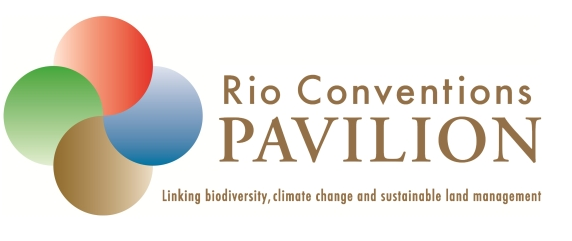The Rio Conventions Pavilion convened in parallel with Rio+20, and aimed to raise awareness and share information about best practices and scientific findings on the implementation of the three Rio Conventions.
The programme focused on daily themes, such as Africa, business, cities, desertification, ecosystem-based adaptation, financing, gender, indigenous and local communities, and oceans.
 June 2012: The Rio Conventions Pavilion (RCP, or the Pavilion) was convened in parallel with the UN Conference on Sustainable Development (UNCSD, or Rio+20), from 13-22 June 2012, in Rio de Janeiro, Brazil. The Pavilion aimed to raise awareness and share information about best practices and scientific findings on the co-benefits to be realized from implementing the three Rio Conventions: the UN Framework Convention on Climate Change (UNFCCC); the Convention on Biological Diversity (CBD); and the UN Convention to Combat Desertification (UNCCD).
June 2012: The Rio Conventions Pavilion (RCP, or the Pavilion) was convened in parallel with the UN Conference on Sustainable Development (UNCSD, or Rio+20), from 13-22 June 2012, in Rio de Janeiro, Brazil. The Pavilion aimed to raise awareness and share information about best practices and scientific findings on the co-benefits to be realized from implementing the three Rio Conventions: the UN Framework Convention on Climate Change (UNFCCC); the Convention on Biological Diversity (CBD); and the UN Convention to Combat Desertification (UNCCD).
The Pavilion programme focused on daily themes, and included: “The Roads from Rio – 20 years of the Earth Negotiations Bulletin (ENB);” Africa Day; Indigenous and Local Communities Day; Ecosystem-Based Adaptation Day; Oceans Day; Land Day and Global Observance of the World Day to Combat Desertification; Business Day; Financing Sustainable Development Day; Gender Mainstreaming Day; the 20th Anniversary of the Rio Conventions; and Cities Day.
The panel celebrating the 20th anniversary of the ENB highlighted its founding in the run-up to the UN Conference on Environment and Development (UNCED, or Rio Earth Summit) in 1992 and subsequent coverage of negotiations, noting that IISD RS now covers about 70 meetings annually. “The Roads from Rio: Lessons Learned from Twenty Years of Multilateral Environmental Negotiations” book, which traces processes covered by ENB since 1992, was launched at this session.
Africa Day and Indigenous and Local Communities Day consisted of three panel sessions, including: economic valuation of land (EVL), an approach to advance sustainable development in the context of a green economy; facilitating green growth in Africa – perspectives from the African Development Bank (AfDB); and the contribution of traditional knowledge to climate mitigation and adaptation.
Ecosystem-based Adaptation Day included four panel sessions on: ecosystem-based approaches (EBA) to adaptation – best practice; EVL – an approach to advance sustainable development in the context of a green economy; the Bonn Challenge – restoring 150 million hectares of degraded landscapes by 2020; and coastal climate change solutions – from principles to practice.
Oceans Day featured seven panels: renewing our political commitments – perspectives on Rio+20; scaling up integrated governance of the oceans; the living ocean – enhancing fisheries for food security, social and economic benefits; small island developing States (SIDS) and oceans – building resilience, enhancing social and economic benefits; climate change and ocean acidification; toward the blue economy and society – perspectives, experiences and initiatives; and moving forward.
Land Day commenced with a high-level round table on the role of sustainable land and soil management in achieving the Millennium Development Goals (MDGs). Panels addressed: a zero net land and soil degradation world; the Global Soil Partnership; and the economics of land degradation. The day concluded with observance of World Day to Combat Desertification and a Land for Life Award reception, which was presented to Sustainable Organic Integrated Livelihoods (SOIL), Haiti.
Business Day panels included: business and the Conventions from Rio to Rio+20; towards a green economy; and bringing industry into the green economy through sustainability, and research and technology. The event concluded with panels and presentations on the Natural Capital Declaration (NCD).
Financing Sustainable Development Day focused on: natural capital solutions – protected areas meeting global environmental challenges; and investing in natural capital in Africa, Asia and Latin America – partnerships, policies and investments. The day concluded with a pre-launch reception for Mozambique’s Green Economy Roadmap.
Gender Mainstreaming Day featured sessions on: mainstreaming gender in the three Rio Conventions – progress to date and way forward; linking research, policy and practice for gender-responsive action in forestry; political leadership and gender, and stakeholders panel; and a celebration of women’s leadership in sustainable development.
The 20th anniversary of the Rio Conventions event consisted of the launch of the pilot partnership on national implementation of synergies among the Rio Conventions, two panels on the role of the Rio Conventions in achieving poverty eradication and how the UN system can better integrate environment within development frameworks, and a celebration of the Conventions.
City Day included three panel events on: local leadership driving global change; cities spurring change – tools and techniques for integrated urban planning; and a sustainable future for our children – the FRUSATO movement. A closing session addressed lessons learned and next steps following Rio+20. [IISD RS Coverage]